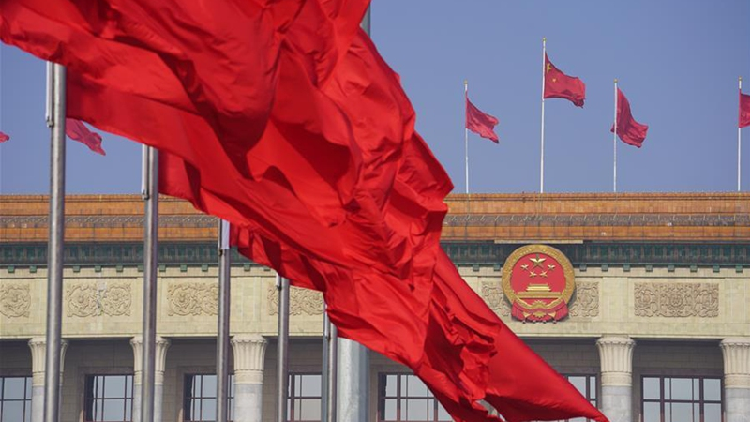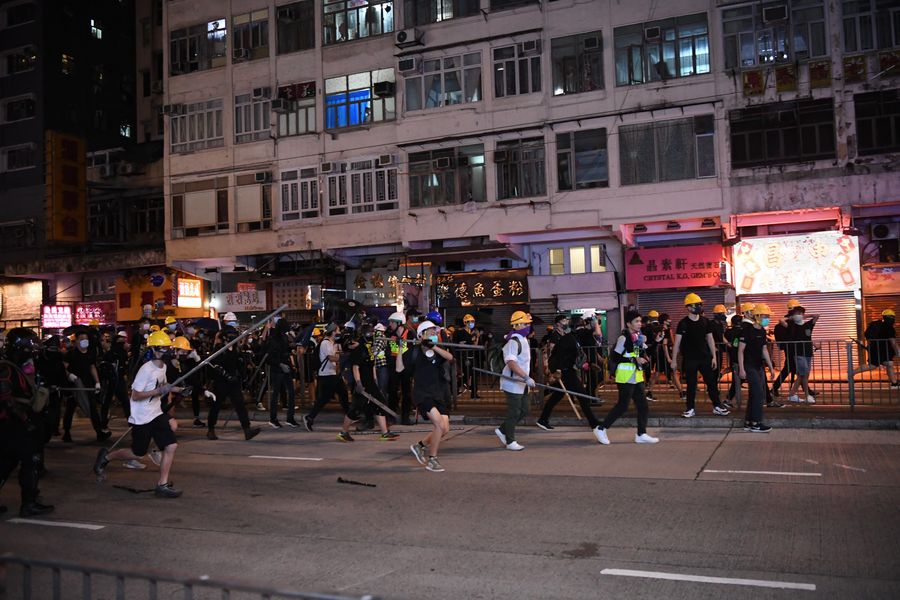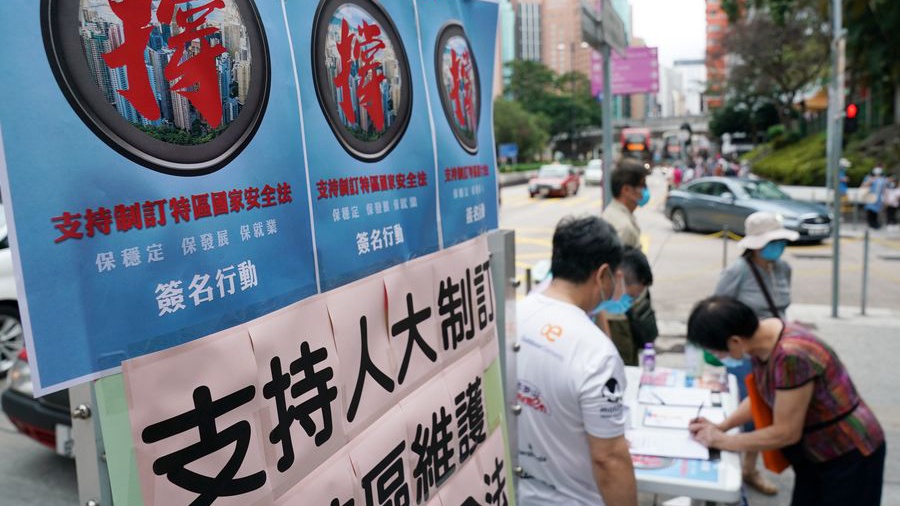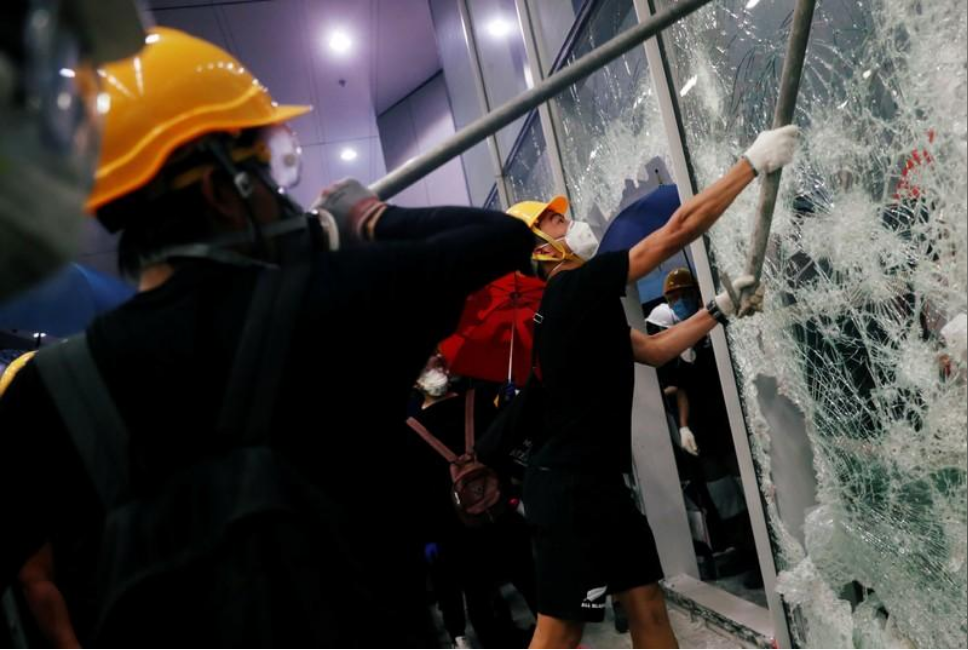00:33

Chinese lawmakers on Tuesday voted unanimously to adopt national security legislation for the Hong Kong Special Administrative Region (HKSAR), a "resolute" effort taken by the central government that will make secession, subversion and collusion with foreign forces illegal.
The decision was made at a session meeting of China's top legislature, with key emphasis on improving the legal system and enforcement mechanisms for the SAR while maintaining its high degree of autonomy under the principle of "One Country, Two Systems."
Read more:
Opinion: Nine key questions on national security legislation for HKSAR answered
HKSAR govt and society voice support for draft national security law
Carrie Lam says national security law 'urgently needed,' laments 'double standards' of critics
"We will still follow the principle of Hong Kong people governing Hong Kong," said Premier Li Keqiang in late May, days after a draft decision to proceed with such a bill was first introduced.
Starting June last year, widespread protests - sometimes radical demonstrations - sparked by a movement against a now abandoned fugitive bill, embroiled parts of the city in a state of complete chaos. The local economy was plunged into the worst crisis since Hong Kong's return to China in 1997, with its GDP contracting by 1.2 percent in 2019.

Violent protesters go after a police vehicle (not pictured) in North Point, Hong Kong Special Administrative Region, China, August 5, 2019. /Xinhua
Violent protesters go after a police vehicle (not pictured) in North Point, Hong Kong Special Administrative Region, China, August 5, 2019. /Xinhua
"In view of the increasingly pronounced national security risks faced by the HKSAR, the enactment of a national security law at the state level is both necessary and urgent in order to plug the loophole in national security in Hong Kong," said Chief Executive Carrie Lam in an official statement, released hours after the passage of the legislation.
"I am confident that after the implementation of the National Security Law, the social unrest which has troubled Hong Kong people for nearly a year will be eased and stability will be restored, thereby enabling Hong Kong to start anew, focus on economic development and improve people's livelihood," read the statement.
The law will be applied in Hong Kong by way of promulgation by local authorities.
What is the national security law?
The national security law, which has 66 articles in six chapters, outlines the duties and government bodies of the HKSAR specifically designed to promote national security.
The law stipulates the important principles of the rule of law that the HKSAR should abide by in safeguarding national security, such as ensuring human rights protection.
Read more:
Hong Kong to set up a national security commission, but how will it work?
A national security committee is set to be established in the Asian financial hub - with its official name yet to be announced. The HKSAR's chief executive will lead the committee; others under the organizational chart include the SAR's chief secretary for administration, financial secretary, secretary for justice, secretary for security and police commissioner.
Officials selected for the group are obligated to analyze and appraise the national security situation in the HKSAR and push for the construction of a relevant legal system and operating mechanism.
According to Xinhua, the legislation is a combination of substantive law, procedural law and organic law contents.
A law that integrates Hong Kongers' suggestions
The central government authorities have enhanced the draft by absorbing Hong Kong residents' opinions as much as possible, Lam said earlier the month.
Based on official records, over 130 suggestions were collected.
Read more:
Carrie Lam: Advice from Hong Kong govt integrated in new national security law
Opinions from Hong Kong to be extensively heard in the process: NPC official

A resident signs during a street campaign in support of national security legislation for the Hong Kong Special Administrative Region, China, May 23, 2020. /Xinhua
A resident signs during a street campaign in support of national security legislation for the Hong Kong Special Administrative Region, China, May 23, 2020. /Xinhua
According to officials, differences between the two legal systems of the mainland and Hong Kong have been taken into account throughout the legislation process.
The legitimate rights and freedoms of the vast majority of Hong Kong residents or the legitimate interests of foreign investors will not be affected, stressed Song Zhe, deputy director of the Hong Kong and Macao Affairs Office of the State Council.
The law will only target the small minority involved in crimes and activities seriously endangering national security, the mainland official said.
After the adoption of the law, the NPC Standing Committee, in accordance with the requirements of the NPC decision, consulted its HKSAR Basic Law Committee and the HKSAR government, and adopted a decision on Tuesday afternoon to list the law in Annex III to the HKSAR Basic Law.
It will come into effect when published in the Hong Kong Gazette, a process which Lam said would happen "as soon as possible."
'One Country, Two Systems'
Proposed in the 1980s, "One Country, Two Systems" is a framework that guarantees a high degree of autonomy for Hong Kong SAR.
The principle lays the foundation for consolidating Hong Kong's status as an international financial center, Chief Executive of Hong Kong Exchanges and Clearing Limited (HKEX) Charles Li said.
The city's global stature has been demonstrated by the fact that the Hong Kong stock exchange topped the global IPO league seven times in the past 11 years, its structured product market has been the largest in the world and it has become the world's second largest bio-tech fund-raising center.

Radical protesters break into the Legislative Council building during the anniversary of Hong Kong's return to China, Hong Kong Special Administrative Region, China, July 1, 2019. /Reuters
Radical protesters break into the Legislative Council building during the anniversary of Hong Kong's return to China, Hong Kong Special Administrative Region, China, July 1, 2019. /Reuters
"Critics claim this, of course, will end 'One Country, Two Systems,'" commented British political and international relations analyst Tom Fowdy. "This is misleading."
"Instead, the bill is being mandated to stop those who are determined to also completely undermine the "One Country" dynamic and push for complete exclusivity for Hong Kong from the conception of China, sometimes even with the collusion and encouragement of foreign governments, which activities are deemed a threat to Hong Kong's prosperity, stability and public order."
Politics Professor at East China Normal University Josef Gregory Mahoney shared the same sentiment, pointing out in an CGTN opinion article that security for Hong Kong and mainland is mutual.
"To undermine one or the other at this point undermines both," he noted. "Those who are holding out hope that delaying or undermining Beijing will forestall further integration have not only grossly misread the real politics of the situation, above all increasingly they risk destroying what they aim to save."
(Cover: Li Zhanshu, chairman of the National People's Congress (NPC) Standing Committee, presides over the plenary meeting of the 20th session of the 13th NPC Standing Committee in Beijing, capital of China, June 30, 2020. /Xinhua)